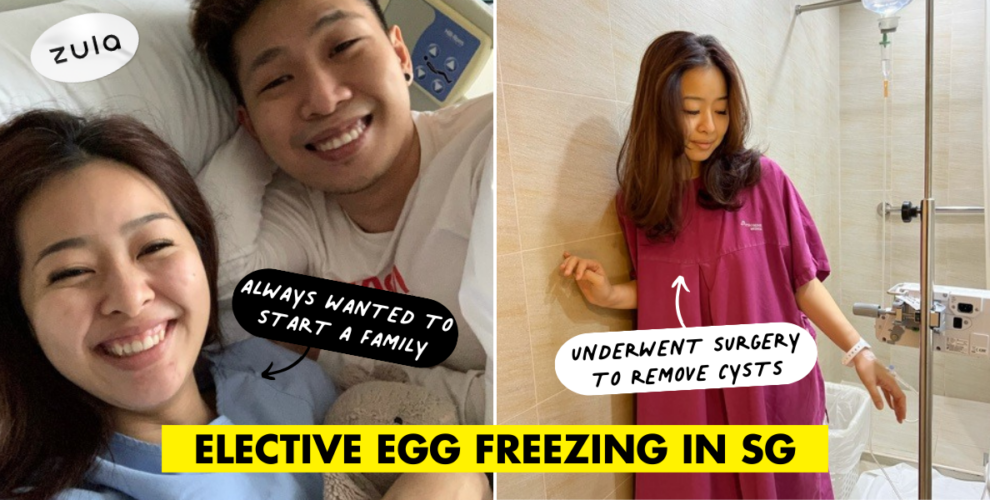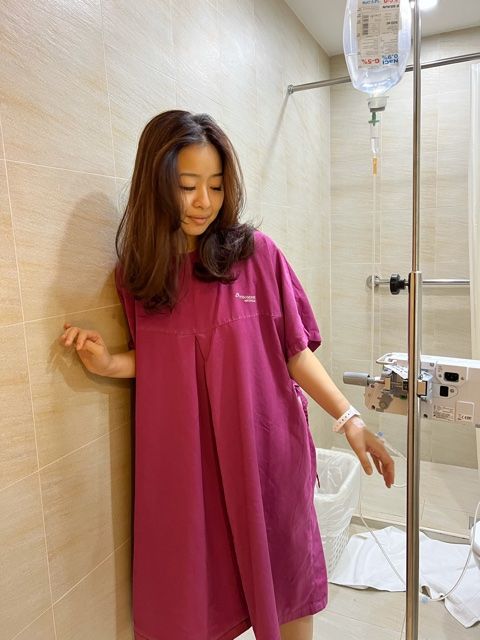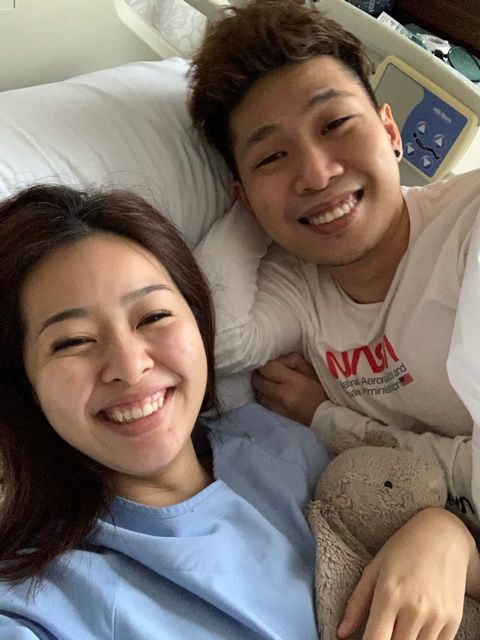Elective Egg Freezing in Singapore
Sometimes I feel like it hasn’t been emphasised enough, but being a woman is tough. To kick things off, there’s the monthly menstruation, and the difficulty of conceiving if we’re past the “prime” fertility age of, like, 35. On a more positive note, Singapore has legalised elective egg freezing for females aged 21 to 37, regardless of their marital status, since July 2023 to extend the fertility shelf life of aspiring mothers.
When the law was put in place, I spoke to Patrina Tan, who recently completed a cycle of elective egg freezing to find out her reasons behind the decision, and her thoughts on conceiving.
Getting married with plans to start a family
Growing up in a big family, 33-year-old Patrina always thought that having kids was a rite of passage for her. She wanted to start her own family, and loved the idea of having a mini version of herself.
“My husband and I have known each other since secondary school, and we dated during Polytechnic before getting married with the intention of starting a family,” Patrina said.
After getting married, Patrina and her husband enjoyed their “alone” time for about two years before deciding it was time to try and conceive. She didn’t think much during the trying period, and every time she didn’t get pregnant, she thought it was just because they hadn’t been lucky enough.
However, even after some time, Patrina still didn’t get pregnant, and she and her husband went for a fertility check. The results came back with no abnormalities, and they were convinced that it was really just a matter of luck.
“I had the eggs, his sperms were working fine, my ovaries were the right size, the right environment, and everything was great,” Patrina commented.
Diagnosed with endometriosis & underwent surgery twice
For the next 6 months, Patrina and her husband continued to try for a child, but lady luck still wasn’t on their side. However, that was also when Patrina noticed that she started experiencing really bad cramps during her period.
“Since it had barely happened to me before, I went for a check-up and found out that I actually had cysts,” Patrina shared. “They were each about 3cm big, which were not life-threatening, but my gynaecologist recommended surgery to remove them since it would help me get pregnant, and I agreed.”
However, little did Patrina imagine that the surgery would be a life-altering event after waking up.
“[The doctor] didn’t tell me that he would be conducting an open surgery, and I woke up to having a 10cm scar on my abdomen,” Patrina recalled.
She blamed herself for not properly assessing the papers she signed prior to the surgery, and was disturbed to learn that she only needed a keyhole surgery after consulting a different gynaecologist 6 months later when she still didn’t get pregnant. When she returned and confronted the first gynaecologist, he dismissed her with excuses.
“I broke down emotionally because I was having such a hard time getting pregnant, and to make things worse, I now had a prominent scar on my abdomen from a surgery that was never needed in the first place,” Patrina said.
Aggravating the situation, her second gynaecologist did another scan and told Patrina that more cysts had returned, but in smaller sizes. However, since it had only been 6 months since her previous surgery, her gynaecologist suspected that Patrina might be suffering from endometriosis.
For the unacquainted, endometriosis is a condition when tissue similar to the lining of the uterus grows outside the uterus. It can lead to severe pain and make it harder for women to get pregnant.
“I decided to leave the cysts alone as they were because they were unlikely to cause an issue back then, and I was still traumatised from the previous surgery,” Patrina recounted.
Half a year later, Patrina went for her regular check-up with another new gynaecologist. This time, they discovered that there was something else other than cysts ‒ it was a 10-cm wide dermoid that had to be removed.
“I burst into tears at the clinic because I didn’t want to go through another surgery,” Patrina shared.
Thankfully, Patrina’s gynaecologist calmed her down, and explained that it would not be an open surgery, but only a keyhole surgery, which she eventually agreed to.
For the next 6 to 9 months, Patrina received medication to pause her menstruation to avoid cysts from forming. While the medication proved useful, it was also the same period when she learned that Singapore legalised egg freezing for women, regardless of marital status and medical condition.
Also read:
5 Singaporean Guys Share If They Would Go For A Vasectomy In The Future & Why
Learning about elective egg freezing in Singapore
Before the legalisation of elective egg freezing in Singapore, it didn’t occur to Patrina that egg freezing could be a viable solution to her situation. She was emotionally and physically drained from the process of trying to conceive, and began to develop second thoughts about having kids.
“My husband isn’t forcing me to have a child, and both of us are currently at a comfortable stage,” Patrina explained. “Our lives will change completely the moment we have a child, so it makes me wonder if it will be alright to lose what we have.”
Now that elective egg freezing is legal in Singapore, Patrina sees it as a method to “extend” the shelf life of her eggs before she comes down to a final decision ‒ to have kids or not.
“I researched the egg freezing process and found a trustworthy fertility centre before signing up at Thomson Fertility Centre,” Patrina said.
She shared her thoughts with her friends and families, all of whom were very supportive of her decision, and she went ahead with the process.
Completing the egg freezing process
Similar to any other medical procedure, Patrina was scheduled to undergo a check-up before attending a consultation with a psychologist. She explained that the fertility centre needed to understand the reason behind her decision, and wanted to learn more about herself too.
“Once I received the green light from the fertility centre to proceed with elective egg freezing, they instructed me to adhere to the strict injection timings they provided,” Patrina shared.
This was because if Patrina missed any hormonal injection, even for a short while, the number of eggs that could be released would be affected.
Patrina found the first few days of her injections the hardest because it happened that her husband was away on a business trip. Having to inject the hormones by herself, she didn’t like the feeling of being alone.
Nonetheless, she pulled through and told herself that everything was going to be alright. For the next few days, she increased her dosage as instructed, after which, she returned to Thomson Fertility Centre for a check-up.
Fortunately, her womb appeared healthy, and she had to go through another week of hormonal injections before she could retrieve her eggs. When the day came, her gynaecologist was able to retrieve 13 eggs, but only 12 of them were mature, which was still considered a healthy number considering her age.
“I plan to freeze them for 3 years before I decide what I want to do with them,” Patrina commented. “If I decide not to have kids, I can choose to either discard or donate them.”
Future plans and advice
As of now, Patrina hasn’t made a choice about whether she would want to have a child because many factors come into play, such as health and age. If she decides to try for a child, she would have to later thaw her eggs and go through IVF. With egg freezing already done, Patrina mentioned that “at least half the process is already done”.
At the same time, she also understands that there is no guarantee that her eggs will be successfully fertilised, so she is trying to let things flow naturally. She will soon be heading for her next check-up, and from then on, she may be able to draw her future plans based on the results.
Her advice to couples who plan to have kids? Go for a fertility check as early as possible because it helps identify potential health issues.
“Avoid having the mindset that a baby will just be formed whenever the couple wants one,” Patrina shared.
Elective Egg Freezing Is Now A Solution For Aspiring Mothers To Extend Their Fertility Shelf Life
Patrina’s journey illustrates that even when life throws unexpected challenges your way, there is always a path forward if you persevere. As we extend our heartfelt wishes to Patrina for the best, we also hope that aspiring mothers will consider exploring options like elective egg freezing to extend the preservation of their fertility.
Cover: Images courtesy of Patrina Tan
Also read:
Guide To Egg Freezing In Singapore – Types Of Procedures, Cost & Side Effects














